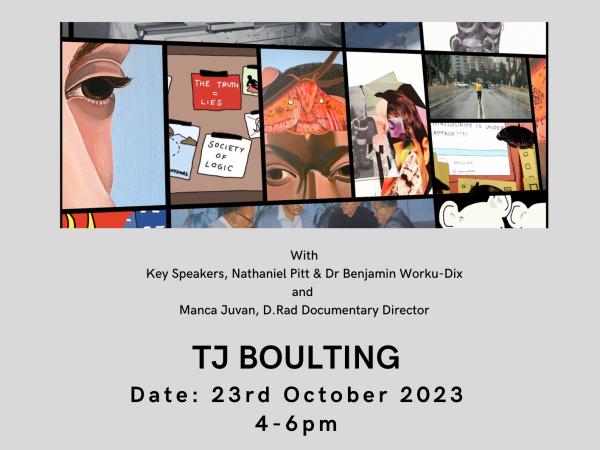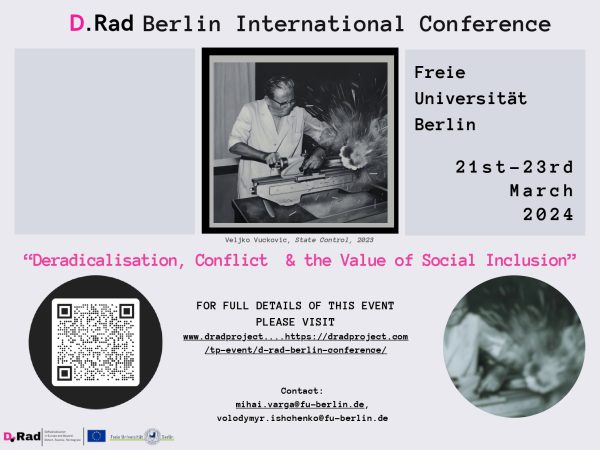Date: Thursday 6th April 2023
Time: 09:30 – 17.30
Location: Political Studies Association Headquarters, Elizabeth Meehan Suite, Regents House, Pratt Mews, London NW1 0AD
Overview: This one-day academic workshop will focus on social mobilisation and radicalisation in everyday contexts following innovative research. We are interested in proposals from scholars working on populist politics, polarisation, extremism, and the social exclusion of marginalised groups more generally. The workshop will offer peer feedback and review on selected papers will later be submitted as special issue journal proposal…..
About D.Rad: D.Rad is a Horizon-2020 funded international research project. D.Rad is a comparative study of radicalisation and polarisation in Europe and beyond. It aims to identify the actors, networks, and wider social contexts driving radicalisation, particularly among young people in urban and peri-urban areas. D.Rad conceptualises this through the I-GAP spectrum (injustice-grievance-alienation-polarisation) with the goal of moving towards measurable evaluations of de-radicalisation programmes. Our intention is to identify the building blocks of radicalisation, which include a sense of being victimised; a sense of being thwarted or lacking agency in established legal and political structures; and coming under the influence of “us vs them” identity formulations.
Our conceptualisation of radicalisation: For our purposes, an individual is radicalised when they a) perceive an injustice, b) leading them to express their grievance by rejecting the established framework of politics and law, and c) to perform their alienation by embracing an alternative identity that rationalises violence, leading them d) to engage in action to advance this cause, potentially with violent consequences. We thus distinguish between, on the one hand, radicalisation and the actual perpetration of extremist violence; and, on the other hand, radicalisation and the channelling of grievances into lawful protest and political action (UNDP, 2016). Radicalisation involves decisive rejection of established law and government, leading individuals to embrace alternative frameworks of justice that permit violence; however, these experiences of alienation do not necessarily lead an individual to acts of violent extremism.
Our multilevel methodology (macro, meso, micro) will capture the actors, institutions and policymaking processes of radicalisation and deradicalisation. Therefore we welcome contributions which focus on these aspects. We examine the drivers of radicalisation in their complexity, from discrimination and alienating experiences of citizenship to family life and everyday socialisation in online and offline communities. Individual (micro) or group grievances (meso) can find resolution through political inclusion or civic inclusion (macro); however, research suggests that resilience is more often linked to bonds of trusts in communities (meso). This is why D.Rad pays particular attention to developing a socio-spatial joint belongingness, or how individuals experience their everyday environments. We hope this conceptualisation is helpful for developing abstracts but are open to submissions beyond the detailed approach.
During the workshop we will consider the following key questions:
- How can feelings of grievance and injustice lead to alienation and radicalisation?
- How do mundane social interactions influence identities and political behaviours?
- Who are the actors, networks and wider social contacts driving radicalisation?
- How can we attempt to resolve or combat the drivers of radicalisation?
- How may individuals affected by grievance, alienation, and polarisation be re-integrated into established contexts?
Workshop Description:
This academic workshop is designed for both early career scholars and established researchers to present and share exciting new research on the themes of social mobilisation and radicalisation. We also welcome contributions from scholars. Presenters will be given 20-minutes to share their research before discussions with the larger group.
This small workshop will also provide a forum for networking with more senior scholars and experts in the field, and developing collaboration between research projects and institutions. Participants will be expected to have draft papers to present at the workshop. This will make it possible to engage in constructive feedback and develop full articles with the prospect of developing a special issue journal submission.
Tea and Coffee will be provided but participants will be expected to cover their own lunch expenses. Unfortunately we are not in a position to cover travel or accommodation expenses to attendees.
Invited Speakers:
Hillary Pilkington, University of Manchester
Peter Romaniuk, CUNY, New York
Call for Papers:
We are looking for 250 word (max) paper abstracts to be received by March 10th 2023. Please email all submissions to doga.atalay@gcu.ac.uk and Marcus.nicolson@gcu.ac.uk
Click for More Info about the D.Rad project



